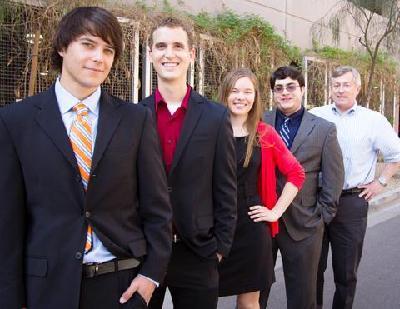
This is the VOA Special English Technology Report.
Students from Arizona State University won top honors last week at the Imagine Cup finals in the United States. Microsoft Corporation organizes the yearly competition.
The Imagine Cup asks students to use their imaginations and their love of technology to solve some of the world's biggest problems. More than 100,000 students in the United States alone registered for the event this year. Twenty-two teams were chosen to take part in the finals in Seattle, Washington.
Team FlashFood won first place in the Imagine Cup's Software Design competition. Eric Lehnhardt is the leader of the team.
Eric Lehnhardt: "The idea is this, that there's a lot of food that goes to waste from hotels, from catered events and from restaurants. And this food is, it's perishable food, so it's the kind of food that can't normally be handled by food recovery organizations like food banks or food pantries."
Eric Lehnhardt says food insecurity affects a lot of people, especially in large population centers.
Eric Lehnhardt: "They don't necessarily know where their next meal is coming from, or that they have to make decisions between paying their bills and whether or not they're going to eat for a day."
The FlashFood team has developed a way to get leftover and unwanted food into the hands of people who need it.
Eric Lehnhardt: "It's a mobile application and website that makes it possible for restaurant managers to enter information about food that they would like to donate into our network - sending a notification then to a team of volunteer drivers who can go pick up the leftover food and take it into a community where those who are living in food insecurity can receive that donation."
Richard Filley is director of the Engineering Projects in Community Service program at Arizona State. The FlashFood team is one of the program's 37 projects. Mr. Filley says winning the Imagine Cup's Software design category is a major honor. But, he says, it is not what energizes his students.
RICHARD FILLEY: "We have students that want to change the world and make a difference and we're very serious about that."
Microsoft is celebrating the tenth year of the Imagine Cup. Mark Hindsbo is a vice president with the company. He says the competition has changed a lot since it first began.
MARK HINDSBO: "It was very computer science focused. Almost all of the students had a computer science background. And the projects themselves were very computer science focused."
Mr. Hindsbo says the students who compete now have different areas of expertise. For example, Team FlashFood had a student who studied biomedical engineering. Another student studied marketing and sustainability. Yet another studied material science and engineering.
MARK HINDSBO: "The projects are much better, much stronger much more exciting as a result because they play off each other's skills."
And that's the VOA Special English Technology Report, written by June Simms. Transcripts, MP3s and podcasts of our reports are at voaspecialenglish.com. Join us again next week for more on the Imagine Cup competition and this year's winning teams. I'm Steve Ember.
Students compete to find tech solutions for world problems
Student architects shine in solar energy contest
Business school prize promotes global water strategies
Business students compete to solve global problems
(来源:VOA 编辑:旭燕)
